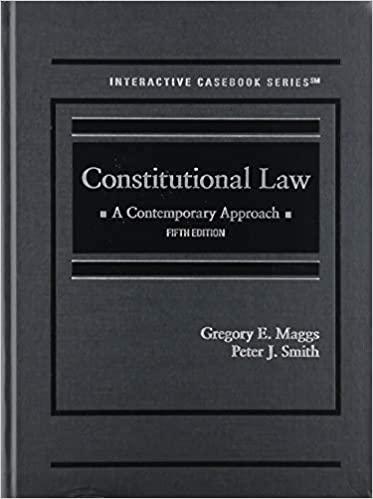Question
Answer ASAP... 1. Paul filed a lawsuit for false imprisonment against Dan's Bookstore. During a visit to Dan's Bookstore, Dan stopped Paul as he left
Answer ASAP...
1. Paul filed a lawsuit for false imprisonment against Dan's Bookstore. During a visit to Dan's Bookstore, Dan stopped Paul as he left the store. Dan accused Paul of stealing a book from the store. After briefly looking into Paul's shopping bag, Dan determined that Paul did not shoplift. He apologized to Paul and released him. On these facts, Dan will likely:
a. win the case, because the shopkeepers' privilege statute gives store merchants unconditional immunity (protection) from such lawsuits.
b. lose the case, because Paul did not shoplift.
c. win the case, but only if a court or trier of fact concludes that Dan had reasonable cause to believe Paul may have shoplifted, detained him for a reasonable time, and in a reasonable manner.
d. lose the case, because Dan did not have a warrant.
2. Bonds wrote McGuire, "I will sell you my house and lot at 419 West Lombard Street, San Francisco, California for $950,000 payable upon merchantable deed, deal to be completed within 60 days of the date of your acceptance." Assuming that Bonds' letter contains terms which are deemed sufficiently certain and definite, which of the following statements is correct?
a. Bonds' letter is not an offer unless Bonds intended it to be an offer.
b. Bonds' letter is not an offer unless McGuire thought Bonds intended to make an offer. c. Bonds' letter is an offer if a reasonable person with full knowledge of the circumstances would be justified in thinking it was intended as an offer..
d. Bonds' letter is not a offer unless both Bonds and McGuire considered it as an offer
. 3. Iverson Jewelers wrote a letter to Miller, "We have received an exceptionally fine self winding Rolox watch which we will sell to you at a very favorable price."
a. The letter is an offer to sell.
b. A valid offer cannot be made by letter.
c. The letter contains a valid offer which will terminate within a reasonable time.
d. The letter lacks one of the essential elements of an offer.
4. Don was negligently driving south on Merdock Avenue when his car rear-ended a car driven by Patty. The force of the impact forced Patty to rear-end Terry's car. In turn, the force of the second impact caused Terry's car to hit a lamppost, which then fell on a house owned by Paul. The force of the impact scared Paul, causing him to immediately have a heart attack. Paul sues Don for negligence. If Paul recovers, the most likely reason is:
a. Paul was able to prove that Don proximately caused Paul's injuries.
b. Paul was able to prove that the damages he suffered were actually caused by Don.
c. Paul was able to prove that Don breached a duty of due care owed by Don to Paul.
d. Paul was able to prove all of the above (a, b & c).
5. Sammy agreed to sell and Larry agreed to buy Sammy's car for $400, payable upon delivery. Sammy delivered and left the car with Larry. However, Larry failed to pay Sammy the $400. After eight years had passed following the delivery and acceptance of the car by Larry, Sammy sued Larry in state court for failure to pay him the $400. Based only on the above stated facts, which of the following statement is most accurate? Assume the UCC applies and the statute of limitations for oral contracts is two years and for written contracts is four years.
a. No contract was ever created between Sammy and Larry.
b. A contract was created but likely not enforceable because the statute of limitations has expired.
c. A contract was created, but it is only enforceable if it is in writing.
d. A contract was created and is enforceable.
6. Bill purchased a can of Sipep from the Ajax Minimart. After he finished drinking the Sipep, Bill noticed that the can contained dead insects stuck on the inside bottom of the can. In a strict product liability tort action against Ajax, Bill must prove, among other things, that:
a. Ajax is a merchant selling Sipep.
b. Ajax knew or should have known of the defective condition.
c. Ajax had prior notice of other similar problems with Sipep products.
d. Ajax actually placed the dead insects into the can.
Step by Step Solution
There are 3 Steps involved in it
Step: 1

Get Instant Access to Expert-Tailored Solutions
See step-by-step solutions with expert insights and AI powered tools for academic success
Step: 2

Step: 3

Ace Your Homework with AI
Get the answers you need in no time with our AI-driven, step-by-step assistance
Get Started


